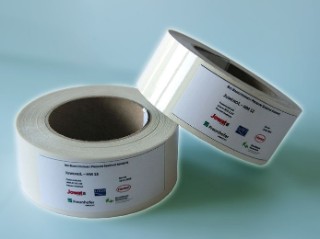
Post-Its, adhesive tape, and labels: They do not lose their adhesive strength, even after being affixed and peeled off multiple times without leaving any residues. This is thanks to the pressure-sensitive adhesives used, which are usually based on fossil raw materials. Together with partners from science and industry, researchers from Fraunhofer UMSICHT have now developed an innovative, plant-based hot-melt pressure-sensitive adhesive.
The demand for products that do not require fossil raw materials has risen sharply in recent years. The “BioPSA” joint project therefore focused on the further development of hot-melt pressure-sensitive adhesives made from renewable raw materials, which can be used, for example, in adhesive tape. The result of the project, in which Westphalian University of Applied Sciences Recklinghausen and its industrial partners Jowat SE, Henkel AG & Co. KGaA and Logo tape Gesellschaft für Selbstklebebänder mbH & Co. KG are involved: A bio-based hot-melt pressure-sensitive adhesive that can also be produced on a large scale.
Bioadhesive on an industrial scale
Pressure-sensitive adhesives (PSAs) are characterized by the fact that they remain permanently tacky at room temperature. A hot-melt pressure-sensitive adhesive is a pressure-sensitive adhesive that is processed from a melt. They are primarily comprised of the three basic components: Primary polymeric ingredient, tackifier, plasticizer, and other additives. Primary polymeric ingredients – also known as base polymers – are responsible for the cohesiveness of the entire formulation and for the adhesion. They give the adhesives their inner strength (cohesion).
The choice of primary polymeric ingredients is very important for producing pressure-sensitive adhesives from renewable raw materials. In view of availability, costs, modification options, sustainability, and compatibility with carrier substrates, poly-L-lactic acid (PLA) was chosen for the “BioPSA” project. This polymer from renewable raw materials is available on a world scale and at comparable prices to fossil-based primary polymeric ingredients. The researchers at Fraunhofer UMSICHT have further developed the properties of a PLA primary polymeric ingredient so that the formulation can be transferred from laboratory scale to industrial practice.
The formulation of the new bioadhesive was developed and optimized at the Recklinghausen site of Westphalian University of Applied Sciences together with the industrial partners Jowat SE and Henkel. The challenge was to use the formulation to achieve adhesive properties similar to those of commercial adhesives.
Patent for new bioadhesive
In close cooperation, the partners of the “BioPSA” project have succeeded in chemically modifying the primary polymeric ingredients so that a PLA-based adhesive can be formulated from it. Two out of 300 formulations have proven to be suitable for the bioadhesive, and have finally been successfully produced and tested by the industrial partners on a small pilot scale.
“We are continuing to improve the formulation and its production so that the PLA adhesives can be used in various areas,” says Dr. Inna Bretz from the Department of Bio-Based Plastics at Fraunhofer UMSICHT. As soon as a manufacturer is found who offers the raw materials for the respective formulations, commercial standards for the production of the new bio-adhesive can also be strived for in the future. The researchers have applied for a patent for both the adhesive composition and the base polymer.
Funding reference
The “BioPSA” project was funded as part of the “Renewable Resources” funding program by the German Federal Ministry of Food and Agriculture (BMEL), which focuses on “adhesives and binders”. The project executing organization was the Agency for Renewable Resources (FNR).
Partners in the “BioPSA” project:
- Westphalian University of Applied Sciences Gelsenkirchen, Bocholt, Recklinghausen
- Jowat SE, Detmold
- Logo tape Gesellschaft für Selbstklebebänder mbH & Co. KG, Harrislee
- Henkel AG & Co. KGaA, Düsseldorf
Source
Fraunhofer UMSICHT, press release, 2019-01-29.
Supplier
Fraunhofer-Institut für Umwelt-, Sicherheits- und Energietechnik (UMSICHT)
Henkel KGaA
Jowat AG
Logo tape
Westfälische Hochschule
Share
Renewable Carbon News – Daily Newsletter
Subscribe to our daily email newsletter – the world's leading newsletter on renewable materials and chemicals









